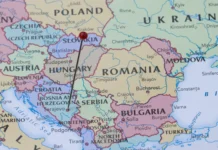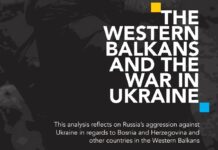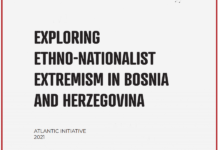The Atlantic Initiative in Bosnia and Herzegovina organized two roundtables on November 8, together with the Royal Norwegian Embassy, the Brčko Vermont Youth Center and the Bijeljina Youth Center, at the School of Economics in Brčko and the Filip Višnjić library in Bijeljina on the topic of European security and Bosnia and Herzegovina. The aim of the roundtables was to inspire an exchange of thoughts and experiences on the Euro-Atlantic integration of Bosnia and Herzegovina, with particular reference to the role of young people in this process.
A large number of citizens from Brčko and Bijeljina joined the roundtable discussions: students and pupils, media representatives, as well as representatives from governmental and NGO sectors.
Discussants on the theme were:
– Prof. Dr. Hamid Alibašić, Vice-Dean and Professor at the School of Economics in Brčko;
– Dr. Edina Bećirević, Professor on the Faculty of Criminal Justice and President of the Atlantic Initiative;
– H.E. Jan Braathu, Ambassador of the Kingdom of Norway in Bosnia-Herzegovina;
– Mićo Mićić, Mayor of Bijeljina;
– Ambassador Fuad Šabeta, Chief of the Department for Peace and Security at the BH Ministry of Foreign Affairs;
– Momir Brajić, Chief of the Section for NATO and the Partnership for Peace;
– Svetlana Krstic, Chairwoman of the Bijeljina Youth Center.
Dr. Bećirević, President of the Atlantic Initiative, informed the audience in Brčko and Biljeljina about the organization’s activities in the country, pointing out that it is “an organization founded last year with the aim of encouraging broad social dialogue on security topics related to Euro-Atlantic integration.”
“We also want to inform the public and increase knowledge on Euro-Atlantic processes and NATO membership,” she said.
Norwegian experience
Jan Braathu, the Norwegian ambassador in Bosnia and Herzegovina, spoke at both roundtables about the experience of Norway as a NATO member.
“We consider that we best know and understand what our interests are. You in BiH also certainly know your interests best and do not want others to be taking decisions on your behalf. We also consider that we can best care about our own security, and if we do it in cooperation with others. And by ‘others’ I mean all our neighbors.”
He said that Norway, as a small member country with less than five million inhabitants, wants to be able to influence its own security and future. “Norway wishes to be asked about all decisions, particularly those influencing our security and interests”, the ambassador added.
Both roundtables in Brčko and Biljeljina also thematized the topic of political and public support for Bosnia-Herzegovina’s efforts of becoming a NATO member.
Ambassador Fuad Šabeta, chief of the Department for Peace and Security at the BiH Ministry of Foreign Affairs, said that political and public support was very good. “We truly have support from all political leaders, from the Presidency and Parliament in BiH. I know this because I’ve been working at the Ministry of Foreign Affairs since it was founded and I can tell you that we’ve had the same priorities since late 1996, or 1997, when we started functioning together.”
Sabeta also stated that, throughout BiH, the latest research has shown public support of 67.9%. “Seven or eight months ago public support was around 70%. In Republika Srpska it is currently 37.2%, which is also a very good result.”
Regional cooperation and weapons reductions in BiH and the region were a topic for Momir Brajić, the Section Chief for NATO and the Partnership for Peace.
“We have significantly reduced the presence of weapons in BiH and the former Yugoslavia and established an excellent level of trust”, Brajić said, mentioning that so far all the countries in the region had destroyed a total of 9,146 pieces of weaponry. “This relates to heavy weapons, artillery, helicopters, tanks, etc. It was a major financial strain for all the countries, but it paid out, because the aim was much higher.”
The most numerous participants of both roundtables were students and pupils from secondary schools. The roundtables were also attended by representatives of media, of administration from the Brčko district and the Bijeljina municipality, from governmental and non-governmental organizations, as well as other interested citizens.
Asked by student Tomislav Gligorović in Brčko as to “why Bosnia and Herzegovina should join NATO”, the Norwegian Ambassador Braathu replied, “we wish that you too take part in the decision-making process when it comes to NATO’s future and how it will protect security throughout Europe. This refers to collective security, to our mutual safety. It is a fact that our mutual safety cannot be made at the expense of someone else. We in Norway cannot feel safe if someone else somewhere in Europe feels less safe. That is why its’ important that all the countries of the former Yugoslavia also be included into the NATIO integration process”, said the ambassador.
Another question by Srđan Abadžić in Biljeljina was related to the political will in Republika Srpska about NATO membership, and whether there were any alternatives. Momir Brajic explained that the “Serb member of the Presidency, Mr. Nebojša Radmanović, actively took part in all meetings and has given his full support to BiH’s integration into NATO. I personally forwarded a letter signed by Mr. Radmanović in person, when BiH applied for MAP, for candidate status in the NATO, and I don’t think that the politics of the main leaders in BiH, of the leading political parties in Republika Srpska, will have changed in this aspect. There may be different ideas about the path toward NATO, about the time-frame, but I believe that strategically looking, there is no alternative in this process at the moment.”
More information for the public
Nevena Todorović, a student in the audience in Bijeljina, directed one of his questions to the Norwegian Ambassador, Braathu. She wanted to know how much NATO membership costs and whether BiH could afford to pay this expense.
“Membership is for free”, Braathu clarified. “What you pay to NATO are running costs, and I am sure that BiH can afford these costs and that NATO membership would not be cause for an increase of costs for BiH. Also there is aid which you get from NATO membership, but it ultimately all boils down to not asking how much you have spent, but how smartly you have spent this money. NATO has also developed methodologies and spending systems, shared with all the alliance members”, the ambassador answered.
It was strongly pointed-out at both roundtables on November 8, in Brčko and Bijeljina, that Bosnia and Herzegovina is strongly determined on its way toward European and Euro-Atlantic integration by having already fulfilled a large number of criteria for NATO membership and that it should continue along this path. Pointing out that Bosnia and Herzegovina’s neighbors are also very determined in this regard was also underlined as a reason for BiH not to “remain an isolated island.”
Another substantial conclusion of the roundtables was that the citizens of BiH should be even more informed about the process of Euro-Atlantic integration and the economic prosperity this kind of integration will make possible.
Text and photo: Velma Šarić, Adnan Avdagić (Sarajevo) and Svetlana Krstić (Bijeljina)








